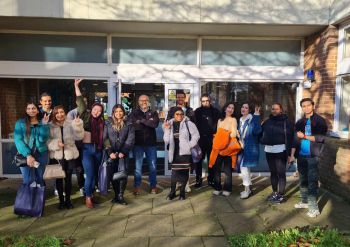Life Sciences Hosts Refugee Open Day: Building Bridges to Higher Education
By: James Andrews
Last updated: Tuesday, 3 December 2024

Life Sciences Hosts Refugee Open Day: Building Bridges to Higher Education
The School of Life Sciences at the University of Sussex recently hosted a Refugee Open Day, welcoming 15 individuals from the refugee community to explore campus life and the opportunities Sussex has to offer.
Organised by the University of Sussex Freedom from Torture Society, the event aimed to build bridges between refugees and the university community while promoting access to higher education. Attendees toured the campus, including the Life Sciences laboratories, where they gained first-hand insights into academic and research opportunities.
The open day also featured talks on university life, facilities, and scholarships, including the Sanctuary Scholarship, which is designed to support refugees and forced migrants pursuing education.
Amina Hassan, a participant in the Open Day, said:
"The Open Day at the Life Sciences School was an incredible experience. It was my first time visiting Sussex University, and I was particularly impressed by the science facilities. The professors provided so much valuable information, and the tour team was extremely supportive throughout. The welcoming atmosphere and engaging presentations made the day enjoyable and inspiring. And we enjoyed the lunch as well. I hope to join the university soon to do my Master’s degree. Thank you so much for the opportunity."
Hilina Tsegaye, another participant, shared:
"It was really an awesome experience. To be honest, I never thought I could see all the departments in such detail, but thank you to Nayeem and Yasmin for doing such a great job. For anyone who wants to join a university and doesn’t know where or how to start, this is a great opportunity. Personally, I want to join the science department, so it was a good chance to see in depth what I would go through, especially the research laboratory. Hopefully, I’ll join the university soon. Thanks again!"
Nayeem Zulkar, President of the University of Sussex Freedom from Torture Society, said:
"I have been working with the refugee community for over four years, and I’ve seen how financial barriers often prevent young people from pursuing higher education. Through scholarships like Article 26, asylum seekers can access universities and build a brighter future. This event was about inspiring them and raising awareness of these opportunities. I’m happy that participants left feeling motivated, and I look forward to organising similar events to support and empower the refugee community."
Yasmin Nayrouz, Secretary of the University of Sussex Freedom from Torture Society, added:
"I really enjoyed giving a tour of our campus to local refugees. It was meaningful for me to show them that there is a welcoming community of students and staff ready to support their educational aspirations at the University of Sussex."
Professor Zahid Pranjol, Deputy Head of School for Education at the School of Life Sciences, remarked:
"It was our pleasure to welcome this diverse group of people to the School of Life Sciences. As a multicultural hub of study and research, we value inclusion, collaboration, and the unique perspectives that enhance our pursuit of knowledge. Sussex has always been a place united by our shared commitment to learning and discovery."
The event marks an exciting step in fostering connections between the refugee community and the University of Sussex. The society, comprised of passionate Sussex students, raises awareness about refugee rights, mental health, and human rights issues while encouraging inclusion on campus.
To learn more about the University of Sussex Freedom from Torture Society, visit their student activities page or follow them on Instagram.
The University of Sussex has a longstanding tradition of supporting refugees and promoting inclusivity. As one of the UK’s first universities to formally commit to being a University of Sanctuary, Sussex has consistently championed the rights of forced migrants, asylum seekers, and refugees. This commitment is deeply rooted in the university’s history of advocating for social justice and providing sanctuary to academics and students fleeing persecution. Notably, during the apartheid era, Sussex became a hub for South African ANC exiles, offering refuge and academic opportunities to those fighting against racial oppression. This legacy of solidarity continues to shape Sussex's efforts to create a welcoming and supportive environment for all.

